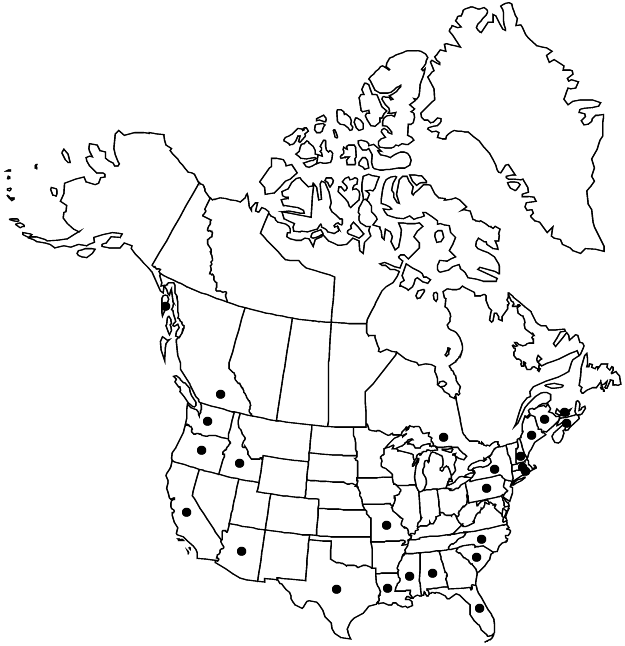Difference between revisions of "Silene gallica"
Sp. Pl. 1: 417. 1753.
FNA>Volume Importer |
imported>Volume Importer |
||
| (One intermediate revision by one other user not shown) | |||
| Line 8: | Line 8: | ||
}} | }} | ||
|common_names=Small-flowered catchfly;silène de France | |common_names=Small-flowered catchfly;silène de France | ||
| + | |special_status={{Treatment/ID/Special_status | ||
| + | |code=W | ||
| + | |label=Weedy | ||
| + | }}{{Treatment/ID/Special_status | ||
| + | |code=I | ||
| + | |label=Introduced | ||
| + | }} | ||
|basionyms= | |basionyms= | ||
|synonyms={{Treatment/ID/Synonym | |synonyms={{Treatment/ID/Synonym | ||
| Line 32: | Line 39: | ||
|elevation=0-2000 m | |elevation=0-2000 m | ||
|distribution=B.C.;N.B.;N.S.;Ont.;P.E.I.;Ala.;Alaska;Ariz.;Calif.;Fla.;Idaho;La.;Maine;Mass.;Miss.;Mo.;N.H.;N.Y.;N.C.;Oreg.;Pa.;R.I.;S.C.;Tex.;Wash.;Europe;introduced worldwide. | |distribution=B.C.;N.B.;N.S.;Ont.;P.E.I.;Ala.;Alaska;Ariz.;Calif.;Fla.;Idaho;La.;Maine;Mass.;Miss.;Mo.;N.H.;N.Y.;N.C.;Oreg.;Pa.;R.I.;S.C.;Tex.;Wash.;Europe;introduced worldwide. | ||
| + | |introduced=true | ||
|tables= | |tables= | ||
|references= | |references= | ||
| Line 54: | Line 62: | ||
|publication title=Sp. Pl. | |publication title=Sp. Pl. | ||
|publication year=1753 | |publication year=1753 | ||
| − | |special status= | + | |special status=Weedy;Introduced |
| − | |source xml=https:// | + | |source xml=https://bitbucket.org/aafc-mbb/fna-data-curation/src/2e0870ddd59836b60bcf96646a41e87ea5a5943a/coarse_grained_fna_xml/V5/V5_374.xml |
|subfamily=Caryophyllaceae subfam. Caryophylloideae | |subfamily=Caryophyllaceae subfam. Caryophylloideae | ||
|genus=Silene | |genus=Silene | ||
Latest revision as of 22:10, 5 November 2020
Plants annual; taproot slender. Stems erect, branched, rarely simple, 15–45 cm, with long, often crinkled hairs mixed with short pubescence, viscid-glandular distally. Leaves 2 per node, blade with coarse, ascending, scabrous pubescence on both surfaces; basal few, withering, blade oblanceolate to spatulate-petiolate, 0.5–5 cm × 3–15 mm; cauline blades oblanceolate to lanceolate, 1–7 cm × 1–15 mm, apex obtuse or shortly acuminate to acute. Inflorescences open, with racemose branches, internodes and bracts usually ca. equaling fruiting calyx, 1–5 mm, longer proximally. Flowers 5–8 mm diam.; calyx prominently 10-veined, narrowly tubular-ovoid in flower, ovoid in fruit, constricted at mouth, 7–10 × 3–5 mm, membranous between veins, margins dentate, hispid, hairs ca. 2 mm, veins parallel, lobes lanceolate, 2–2.5 mm, apex greenish purple, acute; petals white or pink, often with dark spot or dark pink throughout, clawed, claw equaling calyx, limb elliptic to obovate, lobed or unlobed, to 6 mm, appendages 2, oblong to narrowly lanceolate, 1–1.5 mm; stamens equaling or shorter than calyx; stigmas 3, included in calyx. Capsules equaling calyx, opening with 6 recurved, narrowly triangular teeth; carpophore shorter than 1 mm, pubescent. Seeds dark reddish brown, reniform, angular with concave, radially ridged faces, broad outer edge transversely ridged and verrucose, ca. 0.5 mm broad. 2n = 24.
Phenology: Flowering spring–early summer.
Habitat: Dry, open places, sandy and gravelly ground, roadsides, waste land
Elevation: 0-2000 m
Distribution

Introduced; B.C., N.B., N.S., Ont., P.E.I., Ala., Alaska, Ariz., Calif., Fla., Idaho, La., Maine, Mass., Miss., Mo., N.H., N.Y., N.C., Oreg., Pa., R.I., S.C., Tex., Wash., Europe, introduced worldwide.
Discussion
Selected References
None.